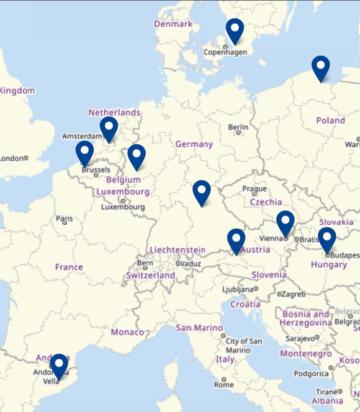Help us make the FRA website better for you!
Take part in a one-to-one session and help us improve the FRA website. It will take about 30 minutes of your time.

EU Charter of Fundamental Rights
Preambulum
Európa népei, az egymás közötti egyre szorosabb egység létrehozása során úgy döntöttek, hogy osztoznak a közös értékeken alapuló békés jövőben. Szellemi és erkölcsi öröksége tudatában az Unió az emberi méltóság, a szabadság, az egyenlőség és a szolidaritás oszthatatlan és egyetemes értékein alapul, a demokrácia és a jogállamiság elveire támaszkodik. Tevékenységei középpontjába az egyént állítja, létrehozva az uniós polgárság intézményét és megteremtve a szabadságon, a biztonságon és a jog érvényesülésén alapuló térséget.
Az Unió hozzájárul e közös értékek megőrzéséhez és továbbfejlesztéséhez, miközben tiszteletben tartja az európai népek kultúrájának és hagyományainak sokféleségét, a tagállamok nemzeti identitását és központi, regionális és helyi közhatalmi szervezetét; a kiegyensúlyozott és fenntartható fejlődés előmozdítására törekszik és biztosítja a személyek, a szolgáltatások, az áruk és a tőke szabad mozgását, valamint a letelepedés szabadságát.
Ennek érdekében a társadalmi változások, a társadalmi haladás, valamint a tudományos és technológiai fejlődés fényében szükséges az alapvető jogok megerősítése e jogoknak egy chartában való kinyilvánítása útján.
E Charta, tiszteletben tartva az Unió hatásköreit és feladatait, valamint a szubszidiaritás elvét, újólag megerősíti azokat a jogokat, amelyek különösen a tagállamok közös alkotmányos hagyományaiból és nemzetközi kötelezettségeiből, az emberi jogok és alapvető szabadságok védelméről szóló európai egyezményből, az Unió és az Európa Tanács által elfogadott szociális chartákból, valamint az Európai Unió Bíróságának és az Emberi Jogok Európai Bíróságának esetjogából következnek. Ebben az összefüggésben a Charta értelmezése során az Unió és a tagállamok bíróságai kellően figyelembe veszik a Chartát megszövegező Konvent elnökségének irányítása alatt készített és az Európai Konvent elnökségének felelőssége mellett naprakésszé tett magyarázatokat.
E jogok gyakorlása együtt jár a más személyek, az emberi közösség és a jövő nemzedékek iránt viselt felelősséggel és kötelezettségekkel.
Az Unió ezért elismeri az alábbiakban kinyilvánított jogokat, szabadságokat és elveket.



